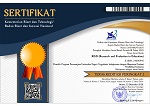Factors discouraging students from schooling: A case study at Junior Secondary School in Laos
DOI:
https://doi.org/10.21831/reid.v1i1.4894Keywords:
classroom and school context, individual student, family, communityAbstract
References
Borich, G. D. (2000).Effective teaching method.London: Prentice Hall, Inc.
Bush, T., & Coleman, M. (2000). Leadership and strategic management in education. London: Paul Chapman Publishing Ltd.
Davis, G. A. & Thomas, M. A. (1989). Effective schools and effective teachers. Massachusetts: Library of Congress Cataloging-in-Publication Data.
Hoy, W. K. & Miskel, C. G. (2008). Educational administration: Theory, research, and practice (8thed.). New York, NY: McGraw-Hall International Edition.
Lefrancois, J. Y. R. (2000). Psychology for teaching. Belmont: Thomson.
McMillian, J. H. & Schumacher, S. (2001). Research in education: A conceptual introduction. New York: Longman.
Mohrman, S. A., Wohlsletter, P., & Associates. (1994). School-based management. San Francisco: Joosey Bass Publishers.
Muijs, D. & Reynolds, D. (2005). Effective teaching: Evidence and practice. London: Sage Publication Ltd.
Orlich, D. C., Harder, R. J., Callahan, R. C., Trevisan, M, S., & Brown, A. H. (2007). Teaching strategies: A guide to effective instruction. New York, NY: Houghton Mifflin Company.
Ormrod, J. E. (2003). Educational psychology: Developing learners. New Jersey: Merrill Prenticee Hall
Roe, W. H. & Drake, T. L. (1980). The principalship. London: Collier Macmillan.
Sallis, E. (1993). Total quality managementin education. London: Kogan Page.
Woolfolk, A. (2007). Educational psychology. New York, NY: Pearson.
Yin, R. K. (2009). Case study research: Design and method (4thed). Thousand Oaks, CA: Sage
Downloads
Published
How to Cite
Issue
Section
Citation Check
License
The authors submitting a manuscript to this journal agree that, if accepted for publication, copyright publishing of the submission shall be assigned to REID (Research and Evaluation in Education). However, even though the journal asks for a copyright transfer, the authors retain (or are granted back) significant scholarly rights.
The copyright transfer agreement form can be downloaded here: [REID Copyright Transfer Agreement Form]
The copyright form should be signed originally and sent to the Editorial Office through email to reid.ppsuny@uny.ac.id

REID (Research and Evaluation in Education) by http://journal.uny.ac.id/index.php/reid is licensed under a Creative Commons Attribution-ShareAlike 4.0 International License.







.png)





